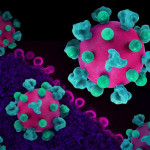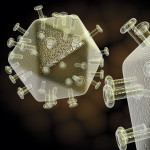An experimental integrase inhibitor from ViiV Healthcare, currently known as S/GSK1349572 (S/GSK-572), was as effective as efavirenz (found in Sustiva and Atripla) in controlling HIV levels with fewer side effects over 24 weeks in a Phase II study. These data were presented at the 10th International Congress on Drug Therapy in HIV Infection, which was held November 7 to 11 in Glasgow and reported by the National AIDS Treatment Advocates Project (NATAP).
Although the current crop of recommended antiretroviral (ARV) drugs is quite potent, each med has its disadvantages. Some have troublesome side effects, while others must be taken several times a day. Needless to say, there’s a demand for new treatments that can be easily joined with other drugs into a single pill that can be taken once daily and that has minimal side effects.
One candidate with the potential to meet all of those challenges in S/GSK-572. It is a second-generation integrase inhibitor that can be taken once daily, without the need for blood-level boosting by Norvir (ritonavir), and that so far appears to have minimal side effects. What’s more, the daily dose is small enough that it should be easily combinable with other drugs into a single pill.
To determine its efficacy in people who hadn’t taken ARV therapy before, Jürgen Rockstroh, from the University of Bonn in Germany, and his colleagues randomized 205 people to take either an efavirenz plus Truvada (tenofovir plus emtricitabine), or Truvada plus one of three potential doses of S/GSK-572: 10 milligrams (mg), 25 mg or 50 mg. The participants in the study were mostly white males, their average age was about 37, and their average CD4 count was 342.
After just 24 weeks, there was a trend toward superior performance with all three doses of S/GSK-572. The percentage of people with viral loads less than 50 copies at 24 weeks was 96 percent with the 10 mg dose, 90 percent with the 25 mg dose and 92 percent with the 50 mg dose. Only 78 percent of those taking efavirenz had viral loads under 50 copies by week 24. CD4 increases were also higher with all three doses of S/GSK-572 (158 to 206) than with efavirenz (110). Roughly 20 percent of people taking efavirenz had a moderate to severe side effect, compared with 10 percent of those taking one of the three doses of S/GSK-572.
This Phase II study will continue for 96 weeks. Also, Phase III studies of S/GSK-572 are either currently under way or will be soon.
Advertisement
Advertisement
Advertisement






Comments
Comments